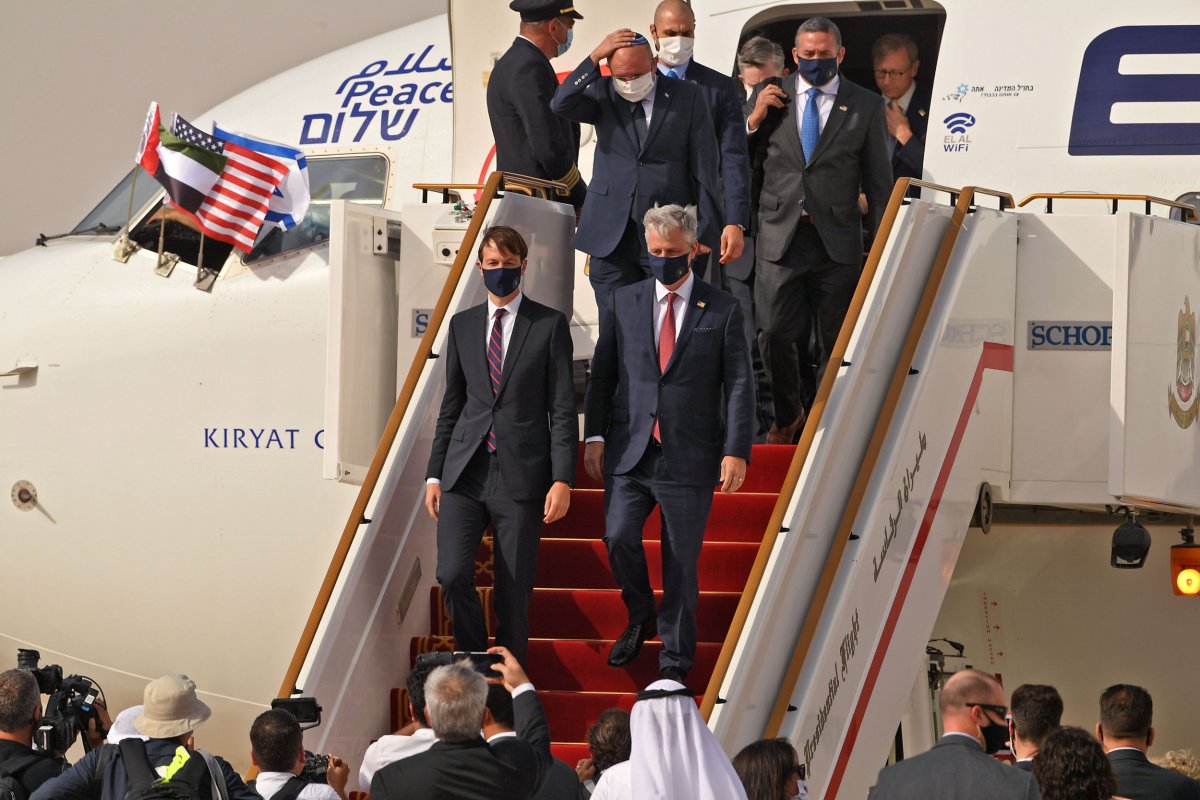The historic formal full peace and normalization between Israel and the United Arab Emirates represents the realization of the Netanyahu Doctrine, which is heralding a new era of peace in the Middle East.
The Netanyahu Doctrine can be summarized as peace in exchange for peace, and peace from a position of strength. This, as opposed to the perhaps well-intentioned, but ultimately failed, paradigm of Israeli territorial concessions in exchange for promises of peace that have yet to materialize.
The Israel-UAE deal marks the third formal peace between Israel and an Arab nation, and the first such accord not involving an Arab country that had previously declared war upon the Jewish state.
The UAE deal will be a warm peace between two of the world's most advanced nations. Normalized relations will be anchored in mutual interests in the fields of the economy, security, technology, energy, health care, culture, the environment and other areas.
As I write these words, an El Al aircraft carrying a joint U.S.-Israeli peace delegation departed Tel Aviv en route to Abu Dhabi in the first-ever direct commercial flight between Israel and the UAE. Over the weekend, the UAE repealed its 48-year-old law boycotting Israel and opened the country to trade and financial agreements with the Jewish state.
Israeli and U.S. administrations have expressed confidence that more peace and normalization deals will follow between Israel and Arab countries. Netanyahu already previously made advancements in relations with such countries as Sudan, Oman, Bahrain and other nations in the Gulf.
The UAE peace pact came about because Israel, under Netanyahu's leadership, has become a global economic and military powerhouse and a beacon of stability and moral clarity in a region too often plagued by upheaval driven by extremist forces—particularly those backed by Iran.
President Trump recently laid the foundations for the Israel-UAE deal with his historic decisions to move the U.S. embassy to Jerusalem, recognize Jerusalem as Israel's capital and affirm Israeli sovereignty over the Golan Heights. President Trump's revolutionary "Peace to Prosperity" plan, the most realistic formula for Mideast peace, served as further impetus for the Israel-UAE accord.
The seeds for peace with Israel were also planted throughout the last decade when Gulf states witnessed Netanyahu's tireless work to isolate Tehran's tyrannical regime at the same time many Western nations engaged in policies that were, to put it mildly, unhelpful in the drive to halt Iran's nuclear ambitions.
Indeed, the driving force behind the sea change in the Gulf states' attitudes toward Israel was Netanyahu's relentless, and at times single-handed, campaign to stop Iran from obtaining nuclear weapons.
The Gulf states must recognize that Iran would already possess nuclear weapons if it were not for Netanyahu's heroic actions.

Time and again, Netanyahu worked to stop the ayatollahs' incessant drive toward an illicit nuclear program while countering Iran's increasing regional hegemony—especially its buildup of terrorist installations on Israel's doorstep.
Netanyahu's Paul Revere-like efforts reached a near crescendo on March 3, 2015, when he stood alone before a joint session of Congress to sound the alarm about the disastrous emerging international nuclear deal with Iran known as the Joint Comprehensive Plan of Action (JCPOA).
The JCPOA "will not prevent Iran from developing nuclear weapons," Netanyahu warned Congress. "It would all but guarantee that Iran gets those weapons, lots of them." Netanyahu slayed the JCPOA myths and delivered real-world facts about the impending Iran deal, even as some opposition politicians in Israel scandalously supported the nuclear agreement.
Gulf nations paid careful attention when Netanyahu ordered the daring January 2018 raid on a secret Iranian facility, while most world leaders sat on the sidelines. The Mossad bust exposed the astonishing extent of Iran's nuclear project and unearthed previously unknown sites utilized to assemble an illegal nuclear program behind the backs of hapless international inspectors.
Netanyahu was vindicated when President Trump kept his campaign promise to withdraw the U.S. from the JCPOA, opting instead to enact an unprecedented sanctions regime targeting Iran.
Israel's peace accord with the UAE, meanwhile, proves Netanyahu's long-standing contention that Jews living in ancient, historic Jewish communities in Judea and Samaria and eastern Jerusalem are not impediments to peace. Rather, Netanyahu repeatedly singled out the Palestinians' rejection of Israel's existence as the obstacle blocking an Israeli-Palestinian agreement.
The deception about Israeli settlements persisted even after Israel's 2005 withdrawal from the Gaza Strip led to the creation of a Hamas fiefdom in the coastal enclave and terrorists' repeated use of the evacuated territory as a launching pad to fire rockets into Israeli civilian population zones.
The UAE deal also corroborates Netanyahu's inside-out approach toward the Palestinians. In the face of repeated Palestinian rejectionism, Netanyahu long argued that a potential deal with the Palestinians could emerge only after Arab nations first make peace with the Jewish state.
While detractors demanded more painful concessions from Israel, Netanyahu posited that peace with the Gulf states might nudge the Palestinians to stop denying the Jewish state's right to exist and perhaps come to the bargaining table to engage in talks based on reality, instead of delusion.
It remains to be seen whether the Palestinian Authority will rise to the occasion and act for the betterment of its own people by accepting talks based on the Trump peace plan. It is crystal-clear that Gulf nations are done sitting around waiting for the Palestinian leadership to come to their senses. Instead, the UAE and other Gulf states are acting in their own interests—those of regional harmony—as the Netanyahu Doctrine comes to life, bearing the fruits of historic real peace.
Aaron Klein is strategic advisor to Prime Minister Benjamin Netanyahu.
The views expressed in this article are the writer's own.
Uncommon Knowledge
Newsweek is committed to challenging conventional wisdom and finding connections in the search for common ground.
Newsweek is committed to challenging conventional wisdom and finding connections in the search for common ground.
About the writer
To read how Newsweek uses AI as a newsroom tool, Click here.








